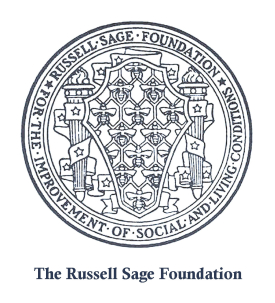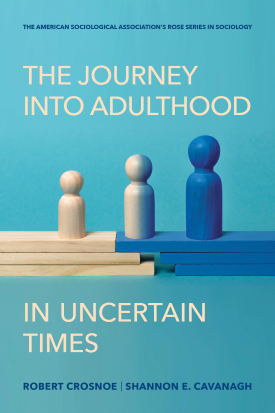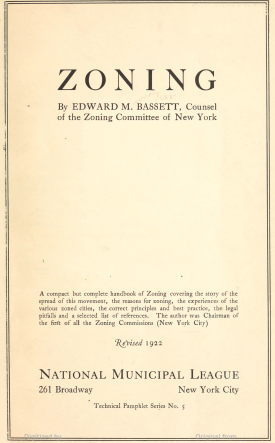About This Book
A compact but complete handbook of zoning covering the story of the spread of this movement, the reasons for zoning, the experiences of various zoned cities, the correct principles and best practice, the legal pitfalls and a selected list of reference.
EDWARD M. BASSETT was chairman of the Zoning Committee of New York.
Download
RSF Journal
View Book Series
Sign Up For Our Mailing List
Apply For Funding
For the 2025 American Sociological Association meeting, RSF is happy to offer discounted titles in our virtual booth. At checkout, enter code ASA25 to receive a 25% discount on all books.
Jump to: RECENT BOOKS | ROSE SERIES | RSF JOURNAL

Southern Mountain Schools Maintained by Denominational and Independent Agencies, Revised Edition
About This Book
In 1911 the Russell Sage Foundation published a directory of Southern Highland Schools. It soon went out of print and in response to numerous requests for up-to-date information, the list in this booklet was prepared. In addition to the schools of the Southern Appalachian region, several schools located in the Ozark Mountains were included. The list was compiled entirely from data supplied by the school authorities, and while other schools were known to exist, only those that responded to requests for information were included.
RSF Journal
View Book Series
Sign Up For Our Mailing List
Apply For Funding

The Journey into Adulthood in Uncertain Times
About This Book
Concerns about the welfare of young adults have received increasing public attention. Numerous magazine and newspaper articles ask, “Are young adults failing to launch?” and “Are global crises creating generations of lost youth?” These questions are driven by worries that young people are either unable or unwilling to transition to adulthood, even when they have aged past traditional definitions of childhood and adolescence. In The Journey into Adulthood in Uncertain Times, sociologists Robert Crosnoe and Shannon E. Cavanagh examine whether young people today are either refusing or failing to grow up.
Drawing on both quantitative and qualitative survey data over five decades, Crosnoe and Cavanagh find that young adults are, in fact, waiting longer to take on “real” adult roles, such as worker or parent. However, this is not out of a reluctance to grow up. Instead, increased inequality and changes in the economy have forced young people to adapt their lives in new ways. Young adults are now spending more time in school, have more trouble finding their footing in the labor force, and consequently postpone getting married and having children. They also mix and match roles in more complicated ways now than in the past—going back and forth between school and work over longer periods of time or disconnecting parenthood from their romantic relationships. While the period from late teens to mid-twenties does look different now than in the past, the change has been slow and steady rather than a dramatic shift due to social crises. The Great Recession, for example, had a more muted effect on young people’s social and economic attainment and family formation than fears of a lost generation would suggest.
Crosnoe and Cavanagh find that while the panic over young adults today may be somewhat overblown, this conclusion should not obscure some clear concerns. Young adults do struggle with their social and emotional well-being. They are more depressed than their counterparts in previous generations, drink less alcohol in ways that suggest less engagement with social life, and express deep distrust of social institutions and the idea of the American Dream. The authors argue that worries about the state of young adulthood today should trigger more reflection about how to support young people rather than how to fix them.
The Journey into Adulthood in Uncertain Times is a comprehensive and illuminating examination of the challenges faced by contemporary young adults.
RSF Journal
View Book Series
Sign Up For Our Mailing List
Apply For Funding
About This Book
This one-page article provides information on how motion pictures of educational value may be obtained. It notes that the General Film Company has recently organized an Education Department and that the department has a catalogue of films that will be sent upon request. Rental prices vary from $5 to $10 a day per reel.
RSF Journal
View Book Series
Sign Up For Our Mailing List
Apply For Funding

Folk Dancing: Illustrating the Educational, Civic, and Moral Value of Folk Dancing
About This Book
This illustrated booklet discusses the moral value of folk dancing. Part I covers folk and national dances. Part II covers the use of folk dancing in a public school system, as shown by its use by the girls’ branch of the Public Schools Athletic League of New York City.
LUTHER H. GULICK was director of the Department of Child Hygiene at the Russell Sage Foundation.
Download
RSF Journal
View Book Series
Sign Up For Our Mailing List
Apply For Funding
About This Book
This booklet contains a list of books, reports, and magazine articles that deal with the topic of recreation. It is arranged by subject, with annotations on the more formal publications, many of which deal with other phases of recreation than the subject under which they are listed. Subjects include play and games, storytelling, folk dancing, sports, holidays, school gardens, boys’ and girls’ clubs, public parks, and walking clubs, among other topics.
RSF Journal
View Book Series
Sign Up For Our Mailing List
Apply For Funding
About This Book
This booklet includes correspondence from Margaret Woodrow Wilson, a daughter of President Woodrow Wilson and a champion of the social-center cause. She appeals to the State Federations composing the General Federation of Women’s Clubs to take up this timely and important task. The correspondence is followed by a typed list of essential provisions of an adequate social-center law.
RSF Journal
View Book Series
Sign Up For Our Mailing List
Apply For Funding
About This Book
This booklet reports on the results of a survey on school social centers sent to 774 school superintendents. It includes charts on cities that reported having schoolhouse social or recreation centers at which there were some paid workers and that reported schools with libraries. The booklet also discusses civic aspects of recent social-center development.
CLARENCE A. PERRY was an urban planner, sociologist, and educator.


